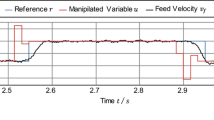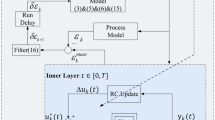Abstract
This paper discusses the multistage manufacturing scenario in context of progressive machining and demonstrates an adaptive control scheme for turning operation of a partially hardened bar. A nonlinear mechanistic force model-based control framework attempts to control the cutting force at a designated set point, with material properties changing over the cut. The force coefficients for the material are calculated offline using experimental data and Bayesian inference methods. Since the hardened part of the bar will shift the force coefficient values, an online estimation strategy (Bayesian recursive least square estimator) is used to learn the new coefficients as well as satisfying the control objective. With the newly learned coefficients passed downstream, the subsequent operation experiences no compromise of control objective as well as reduces the maximum values of force encountered. Numerical analyses presented show the adaptation and control scheme performance. Finally, the experimental analysis show the open-loop and closed-loop model adaptation and effective force set point regulation using experimental apparatus and partially hardened MS (AISI1045) bar.
Similar content being viewed by others
References
Ulsoy GA, Koren Y (1993) Control of machining process. J Dyn Syst Meas Control 115:301–308
Koren Y (1983) Computer control of manufacturing systems. McGraw Hill Book Company.
Koren Y (1988) Adaptive control systems for machining. In American control conference.
Benardos P, Mosialos S, Vosniakos G (2006) Prediction of workpiece elastic deflections under cutting forces in turning. Robot Comput Integr Manuf 22:505–514
Mehta P, Mears L (2011) Model based prediction and control of machining deflection error in turning slender bars. In international manufacturing science and engineering conference, Corvallis
O’Sullivan E (2011) A review of international approaches to manufacturing research. Cambridge.
Landers R, Ulsoy A, Ma Y (2004) A comparison of model-based machining force control approaches. Int J Mach Tools Manuf 44:733–748
Masory O, Koren Y (1983) Variable gain adaptive control system for turning. J Manuf Syst 2(2):165–173
Landers R, Ulsoy G (2000) Model-based machining force control. J Dyn Syst Meas Control 122:521–527
Park Y, Kim T, Woo J, Shin D, Kim J (1998) Sliding mode cutting force regulator for turning process. Int J Mach Tools Manuf 38:911–930
Harder L, Iaaksson A (1997) Force control in turning based on robust PI controller design. J Eng Manuf 211:165–175
Elvestawi MA (1987) Parameter adaptive control in peripheral milling. Int J Mach Tools Manuf 27(3):399–414
Wilson SP, Dahyot R, Cunningham P (2008) Introduction to Bayesian methods and decision theory. In maching learning techniques for multimedia. Springer, pp. 3–19.
Tipping M (2003) Bayesian inference: an introduction to principles and practices in machine learning.
Mehta P, Kuttolamadom M, Mears L (2012) Machining process power monitoring: Bayesian update of machining power model. In proceedings of seventh annual international manufacturing science and engineering conference. Notre Dame.
Qin Y, Park S (2005) Robust adaptive control of machining operations. In Proceedings of IEEE international conference on mechatronics and automation. Niagara Falls.
Ljung L (1999) System identification—theory for the user. Prentice-Hall.
Chatterjee S, Alam S, Mishra R (2009) Sequential Bayesian technique: an alternative approach for software reliability estimation. Sadhana 34(2):235–241
Simon D (2006) Optimal state estimation, Willey.
Mehta P, Werner A; Mears L (2013) Condition based maintenance-systems integration and intelligence using naive Bayesian classification and sensor fusion. J Intell Manuf.
Author information
Authors and Affiliations
Corresponding author
Rights and permissions
About this article
Cite this article
Mehta, P., Mears, L. Adaptive control for multistage machining process scenario—bar turning with varying material properties. Int J Adv Manuf Technol 78, 1265–1273 (2015). https://doi.org/10.1007/s00170-014-6739-x
Received:
Accepted:
Published:
Issue Date:
DOI: https://doi.org/10.1007/s00170-014-6739-x




